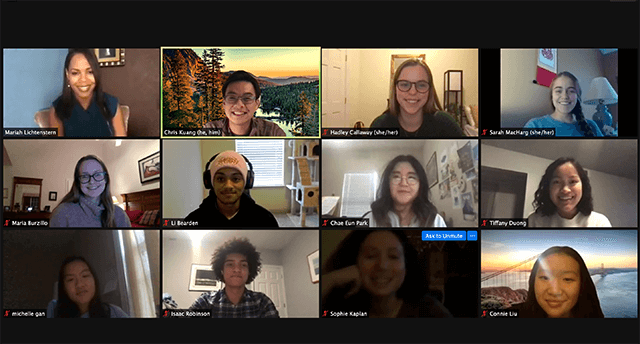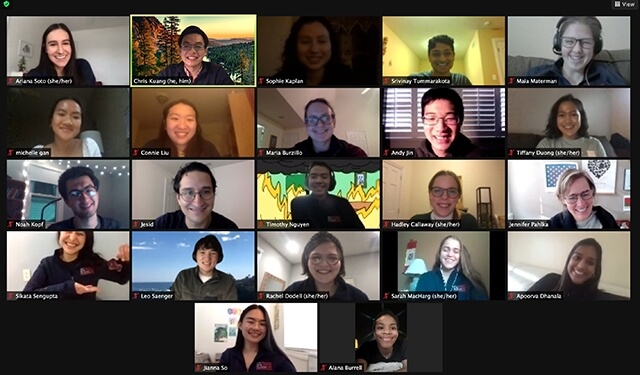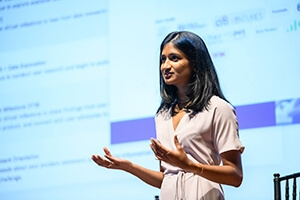News
Coding it Forward's Fall 2020 Civic Digital Fellows meet with Mariah Lichtenstern, Founding Partner and Managing Director of DiverseCity Ventures. (Image provided by Coding it Forward)
In December, officials discovered a massive cyberattack had led to data breaches at many U.S. government agencies, including the Departments of Defense, Homeland Security, and Treasury.
One of the farthest-reaching cyber-espionage events in U.S. history, the attack highlights the critical importance of cybersecurity, and the need for skilled computer scientists and engineers to help the government stay one step ahead of hackers.
Coding it Forward, a nonprofit organization founded at Harvard University in 2017, is helping to meet that need. The organization seeks to create pathways for the best and brightest technology students to pursue careers in government.
The 10-week Civic Digital Fellowship, which the organization launched to help tech students find internships at government agencies, gives students the opportunity to put their skills to use for the public good.
“It really comes down to the impact a student would want to have with their skills,” said Chris Kuang, A.B. ’20, co-founder and director of operations. “Am I happy optimizing something to sell more ads or drive clicks on a product or service that isn’t necessarily making a positive impact on someone’s life, or do I want to work on something that will better the lives of everyday Americans across the country?”
| Applications for the 2021 Civic Digital Fellowships are now open. Click here to learn more and apply by Jan. 24. |
Over the past three years, Coding it Forward has placed more than 200 civic-minded students at 11 federal agencies. Students have taken on roles like product managers, designers, and data scientists at the IRS, the State Department, and the Census Bureau, among other parts of the government.
“When we are looking for Civic Digital Fellows, we are looking for people who not only bring technical expertise, but also bring this mindset of a bureaucracy hacker—the ability to navigate ambiguity, the ability to advocate for what you believe is the best course of action and back it up, and the ability to translate technical details to nontechnical stakeholders,” Kuang said. “All of that is even more important than the technical side of it.”
Coding it Forward typically offers the fellowship each summer, but tweaked the program to offer a fall version in 2020 for students who chose to take a semester off.
That’s what Maria Burzillo decided to do. She spent 10 weeks working remotely at the Census Bureau on the Advancing Health Data program. The program works with external partners to link individual-level health records data with census data to uncover new statistics, such as a breakdown of hospital visits by race, income, or occupation.
Code for America Founder and Former U.S. Deputy Chief Technology Officer Jennifer Pahlka speaks with Coding it Forward's Fall Civic Digital Fellows. (Image provided by Coding it Forward)
Burzillo, A.B. ’21, an applied math concentrator at the John A. Paulson School of Engineering and Applied Sciences, spent most of her time building data visualizations to make the information more engaging, accessible, and digestible for the general public. While it has been challenging to navigate the red tape around acquiring and publishing sensitive information, she has had a lot of fun working with important health data.
“It has also been fun to get an inside look at the Census Bureau. I knew the Census Bureau did the decennial census and produced some statistics, and thought that was pretty much it. But there is so much going on at the Census Bureau that I didn’t know about,” she said. “They have all these people working on really cool economic research projects; they are doing a lot of research beyond just collecting data.”
Giving students a peek behind the curtain at important government agencies is one aim of Coding it Forward. And to help them get in on the ground floor after graduation, the organization recently expanded to offer a new fellowship.
The Impact Fellowship, a program jointly sponsored by Coding It Forward, the Federation of American Scientists, and Schmidt Futures, matches recent graduates with agencies for a one-year project focused on a pressing societal problem. Six inaugural Impact Fellows are currently serving five agencies.
For Kuang, it has been especially rewarding to see the concrete impacts these fellows have had at their respective agencies. In an era where divisive political rhetoric and legislative logjams are rampant, the efforts of the Civic Digital Fellows and Impact Fellows show that government can work for everyone.
“The first thing we say to our fellows is that their work in the federal government is not political,” he said. “They are not there to work for a particular party or executive, but for everyday Americans, and you can see that play out in the projects our fellows do.”
|
|
Q&A with Kiran Wattamwar, M.D.E. ’19, a former Civic Digital Fellow |
Topics: Computer Science
Cutting-edge science delivered direct to your inbox.
Join the Harvard SEAS mailing list.
Press Contact
Adam Zewe | 617-496-5878 | azewe@seas.harvard.edu





